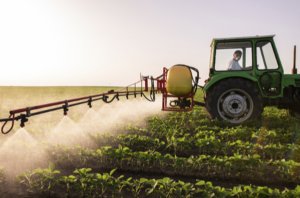
Table of Contents
ToggleIn the world of modern agriculture, where sustainability is becoming increasingly important, the importance of liquid fertilizers is growing. Liquid fertilizer is a concentrated solution of nutrients that plants can easily absorb when applied as a liquid. It is a type of fertilizer that is dissolved in water and applied directly to the soil or sprayed onto plants. Liquid fertilizers typically contain various combinations of essential nutrients such as nitrogen (N), phosphorus (P), and potassium (K), as well as secondary and micronutrients.
They are commonly used in agricultural and horticultural practices to provide plants with the necessary nutrients for healthy growth and development. The advantage of liquid fertilizer is its quick availability to plants, as it can be absorbed through the plant’s root system or foliage. Learn more about types of liquid fertilizers at Arihant Group Of Industries.
Liquid fertilizers encompass a diverse range of nutrient solutions, including nitrogen, phosphorus, potassium, and micronutrients, dissolved in water or other carriers. They offer several advantages over conventional fertilizers, including rapid nutrient absorption by plants and precise application targeting specific growth stages. Liquid fertilizers can be categorized based on their nutrient composition, ranging from simple solutions to complex blends tailored to specific crop requirements.
| Conventional Fertilizer | Liquid Fertilizer | |
| Physical Form | Solid (granules, pellets, powders) | Liquid |
| Composition | A blend of essential nutrients (N, P, K) and micronutrients | Essential nutrients + additional ingredients (growth stimulants, organic compounds) |
| Absorption and Availability | Nutrients take time to be available | Nutrients are readily available for immediate uptake |
| Application | Spread manually or using mechanical spreaders | Foliar application or irrigation systems |
| Nutrient Delivery | Slow release, gradual nutrient availability | Quick release, immediate nutrient availability |
In conclusion, while both liquid fertilizer and conventional fertilizers have their characteristics, liquid fertilizers tend to offer more efficiency and faster absorption by plants, making them a popular choice for many farmers and gardeners.

AND MANY MORE
In the pursuit of sustainable agriculture, liquid fertilizers emerge as a promising solution. Their liquid form allows for efficient nutrient absorption by plant roots, minimizing nutrient runoff and environmental pollution.
Liquid fertilizers are a valuable tool in eco-conscious farming practices due to their precision application, lower carbon footprint, and efficient nutrient uptake by plants. They are quickly absorbed, minimizing nutrient loss and promoting efficient use.
Liquid fertilizers also allow for flexibility in nutrient formulation, allowing farmers to customize their application to meet specific crop and soil needs. They are compatible with organic farming practices, as they can be derived from organic sources.
Liquid fertilizers can also include additives like organic pest controls or beneficial microorganisms, supporting integrated pest management. They can be applied through irrigation systems, conserving water resources and energy.
Additionally, liquid fertilizers can contain soil amendments, improving soil structure, fertility, and microbial activity. These advantages make liquid fertilizers a valuable tool for farmers seeking sustainable and environmentally friendly agricultural practices.
Overall, liquid fertilizers offer numerous benefits in eco-conscious farming, including reduced environmental impact, improved nutrient management, water conservation, enhanced crop productivity, and support for organic farming practices. Furthermore, their versatility in application methods, including foliar spraying and fertigation, enables farmers to optimize nutrient uptake while minimizing waste.
One of the cornerstone benefits of liquid fertilizers lies in their positive impact on soil health. Unlike conventional fertilizers, which may contribute to soil compaction and nutrient imbalances, liquid fertilizers improve soil structure and promote microbial activity. By fostering a healthy soil ecosystem, liquid fertilizers mitigate the risk of nutrient leaching and enhance the long-term productivity of agricultural land.
Do you want to know more about slow-release liquid fertilizer?
The use of liquid fertilizers aids in the delivery of balanced nutrients required for maximum plant growth and development. Liquid fertilizers help to increase crop quality and production by correcting nutritional shortages and providing a consistent supply of key elements. Furthermore, their potential to increase plant tolerance to environmental stresses emphasizes their importance in sustainable agricultural operations.
Looking ahead, ongoing research and development initiatives hold promise for further advancing liquid fertilizer technology. Innovations aimed at enhancing nutrient efficiency, reducing environmental footprints, and improving compatibility with organic farming practices are underway. By embracing these innovations and integrating them into sustainable farming systems, stakeholders can continue to enhance the role of liquid fertilizers in promoting eco-conscious agriculture.
In conclusion, liquid fertilizers represent a sustainable solution for eco-conscious farming practices. By mitigating environmental risks associated with conventional fertilizers, enhancing soil health, and optimizing crop productivity, liquid fertilizers offer a pathway toward more sustainable agriculture.
As we strive to meet the growing demand for food production while preserving natural resources, embracing the benefits of liquid fertilizers becomes imperative. They contribute to eco-conscious farming practices by reducing environmental impact, promoting efficient nutrient uptake, conserving water resources, and supporting organic farming practices.
Liquid fertilizers also improve soil health, enhance crop quality and yield, and have the potential to withstand environmental stresses. Ongoing research and development in liquid fertilizer technology will further advance their effectiveness, nutrient efficiency, and compatibility with sustainable farming practices.
With their numerous benefits and continuous innovations, liquid fertilizers have a promising future in promoting sustainable and environmentally friendly agricultural practices.

